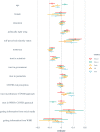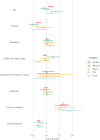Susceptibility to misinformation about COVID-19 around the world
- PMID: 33204475
- PMCID: PMC7657933
- DOI: 10.1098/rsos.201199
Susceptibility to misinformation about COVID-19 around the world
Abstract
Misinformation about COVID-19 is a major threat to public health. Using five national samples from the UK (n = 1050 and n = 1150), Ireland (n = 700), the USA (n = 700), Spain (n = 700) and Mexico (n = 700), we examine predictors of belief in the most common statements about the virus that contain misinformation. We also investigate the prevalence of belief in COVID-19 misinformation across different countries and the role of belief in such misinformation in predicting relevant health behaviours. We find that while public belief in misinformation about COVID-19 is not particularly common, a substantial proportion views this type of misinformation as highly reliable in each country surveyed. In addition, a small group of participants find common factual information about the virus highly unreliable. We also find that increased susceptibility to misinformation negatively affects people's self-reported compliance with public health guidance about COVID-19, as well as people's willingness to get vaccinated against the virus and to recommend the vaccine to vulnerable friends and family. Across all countries surveyed, we find that higher trust in scientists and having higher numeracy skills were associated with lower susceptibility to coronavirus-related misinformation. Taken together, these results demonstrate a clear link between susceptibility to misinformation and both vaccine hesitancy and a reduced likelihood to comply with health guidance measures, and suggest that interventions which aim to improve critical thinking and trust in science may be a promising avenue for future research.
Keywords: COVID-19; fake news; misinformation; vaccine hesitancy.
© 2020 The Authors.
Conflict of interest statement
We declare we have no competing interests.
Figures



References
-
- Roser M, Ritchie H, Ortiz-Ospina E, Hasell J. 2020. Coronavirus pandemic (COVID-19). Our World Data. See https://ourworldindata.org/coronavirus (accessed on 18 May 2020).
-
- World Health Organization. 2020. Novel Coronavirus (2019-nCoV) Situation Report, 13 See https://www.who.int/docs/default-source/coronaviruse/situation-reports/2....
-
- BBC News. 2020. Ofcom: Covid-19 5G theories are ‘most common’ misinformation 21 April See https://www.bbc.co.uk/news/technology-52370616
Associated data
LinkOut - more resources
Full Text Sources
